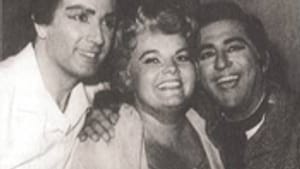Stay in the Loop
BSR publishes on a weekly schedule, with an email newsletter every Wednesday and Thursday morning. There’s no paywall, and subscribing is always free.
Yesterday's great voices, reconsidered

DANIEL WEBSTER
In the hours between Die Meistersinger and The Barber of Seville my older daughter was born, a reminder to a music writer that important things can also happen outside the opera house. That was in Boston in the late ’50s, when the Met still toured, bringing a week of fire and some brimstone to a city still shaking the winter ice off its lapels. It was still in shock, too, after seeing its opera house razed to make a parking lot for Northeastern University. So the Met’s visit was both reassurance and rebuke, and its performances in a Washington Street movie theater rewarded listeners with exuberance and a lot of guilt.
“Unforgettable” was the term, for those Boston winters were long, casts were strong, productions were predictable, they were specific and didn’t crowd the singing. In front of all that, singers held first place, even when, as happened one night, it took three tenors to complete Lohengrin. I can remember casts from that era better than those of recent productions, but that is a product of youth, discovery, envy of an even older generation and, well, birthing.
So for me Paul Schoeffler defined Hans Sachs; Robert Merrill, Figaro; Salvatore Baccaloni, Dr. Bartolo; and my pantheon had niches for Rise Stevens, Lisa Della Casa, Eleanor Steber, Ludwig Weber, Leontyne Price, Mario del Monaco, Irmgard Seefried, Giuseppi di Stefano, Elisabeth Schwarzkopf, Renata Tebaldi, Richard Tucker, Beverly Sills, Leonard Warren, Jussi Bjoerling, Jan Peerce (who telegraphed me one day, "You stink!"), Birgit Nilsson and on and on.
Glorious, I tell myself, and wholly meaningless. Meaningless because opera lives in memory that is purely subjective. To every name I cherish, anyone can scoff: "But she sang flat her whole life"; “He never sang real words"; "Without the prompter, he was at sea"; and "She recomposed her arias every night" or "That was Turandot?"
All true. Just listen to old recordings to challenge your memory of an idol. How I loved Eileen Farrell. Her recordings of Agathe’s arias from Der Freischutz consoled me in black moments. Until one day I didn’t need consolation and I listened carefully. Her intonation was awful. But Farrell never lost her place as my ideal voice and temperament for Agathe. She never sang the role onstage, but sings it still to me.
Earlier in the ‘50s, when I was playing horn in Salzburg and Vienna, we were all in love with Irmgard Seefried. And why not? She was graceful, a little fey onstage, mysterious, warm, tantalizingly pure. I quickly extrapolated omniscience and supremacy. Recordings don’t help sustain that youthful glow as much as I wish, but my memory of her Susannah has made me challenge the performances of nearly two generations of singers since then.
And so down the list. In years of writing about opera, I was working from imagined standards that could never be shared by anyone (except, possibly, my wife). Every judgment came from that weird matrix of emotion, schooling, mishearing, youthful enthusiasm, surprise, unfamiliarity with text and music, idolatry, anger at supposed lapses and idealism. This Adina sang from a concept far different from that of X, whom I had adored ten years before. Therefore she was— what? Better? Worse? Inadequate? Sensational?
Letters of protest from readers invariably followed, each starting, "I can’t believe we attended the same performance.” And, of course, we hadn’t. I had my preconceptions; you had yours. Sometimes good ears can’t even agree on intonation.
So arguments about who was greater, who was more artistic, more exciting, more profound, more musical, more theatrical, can seldom be resolved. Of course my perceptions were more incisive than yours— but, you counter, did you ever hear Helga Pilarczyk sing that?
And so the debate now is about the supposed absence of great voices onstage. Where have the Nilssons, Flagstads, Corellis, Melchiors, Lehmanns, Tebaldis and di Stefanos, gone? Why aren’t magnificent basses, eloquent baritones, soulful mezzos and sopranos burning with temperament and power available for every opera?
(Intelligent design would seem to have a role here. Shouldn’t 35 incipient fine singers be born very year within 15 miles of each opera house?)
Another generation will wonder at our pickiness. Their memory will have stored matchless performances, intense admiration, anger, disdain, and wonder at the singers who have emerged even though they live in a society that does everything it can to discount serious music and its four centuries of evolution. This rising generation will develop its own standards and memories, will develop a sense of nostalgia for singers it never heard (those we now hear skeptically), and raise its own questions about the viability and future of opera. For us, we question our own generation of singers and conductors while idolizing an earlier time. My daughter, while amused that I remember her birthday by first reciting the casts of Die Meistersinger and The Barber of Seville, can’t quite understand the motivating force. Great casts, I think. Great performances. Cultural monuments, really. Yet no one else at those performances remembers them that way. Many must have bemoaned the decline of great voices and the mindless adulation of minor singers even then. Oh, but did you ever hear Chaliapin?
Sign up for our newsletter
All of the week's new articles, all in one place. Sign up for the free weekly BSR newsletters, and don't miss a conversation.